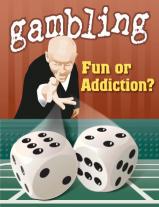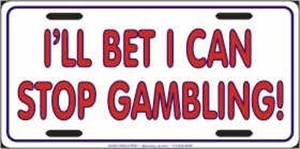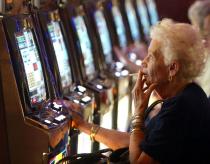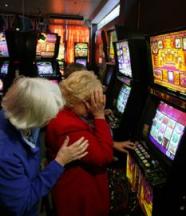Gambling Awareness
Gambling can provide entertainment to many. However, gambling can become an addiction. If you, or someone you know, have a problem with gambling, please contact the following:
Gamblers Anonymous (888) GA-HELPS
http://www.gamblersanonymous.org
Massachusetts Council on Compulsive Gambling (800) 426-1234
http://www.masscompulsivegambling.org/
The Massachusetts Department of Public Health / Bureau of Substance Abuse Services provides problem gambling treatment services for both the gambler and his/her family members. Appointments to see a gambling treatment counselor can be made during regular business hours, Monday - Friday, between 9 a.m. and 5 p.m. There are 17 centers strategically located throughout Massachusetts, the following location is closest to Sterling, MA:
Henry Lee Willis Community Center 44 Front St, Suite 410Worcester, MA 01608(508) 799-2934http://www.williscenter.org/
Frequently Asked Questions About Gambling
What is compulsive gambling?
Compulsive gambling is a progressive illness. People who have this illness may look normal. However, when untreated, the illness can progress until it destroys you personally and financially. It can devastate your family and friends, and affect all who know you.
 What is problem gambling?
What is problem gambling?
Problem gambling includes all gambling behavior patterns that compromise, disrupt or damage personal, family or vocational pursuits. The essential features are increasing preoccupation with gambling, a need to bet more money more frequently, restlessness or irritability when attempting to stop, "chasing" losses, and loss of control manifested by continuation of the gambling behavior in spite of mounting, serious, negative consequences. In extreme cases, problem gambling can result in financial ruin, legal problems, loss of career and family, or even suicide.
What types of gambling cause the most problem gambling?
Again, the cause of a gambling problem is the individual’s inability to control the gambling. Therefore, any type of gambling can become problematic, just as an alcoholic can get drunk on any type of alcohol. But some types of gambling have different characteristics that may exacerbate gambling problems. While these factors are still poorly understood, anecdotal reports indicate that one risk factor may be a fast speed of play. In other words, the faster the wager-to-response time with a game, the more likely players may be to develop problems with a particular game.
What kind of people become problem gamblers?
Anyone who gambles can develop problems if they are not aware of the risks and do not gamble responsibly. When gambling behavior interferes with finances, relationships and the workplace, a serious problem already exists.
Can you be a problem gambler if you don't gamble every day?
The frequency of a person's gambling does not determine whether or not they have a gambling problem. Even though the problem gambler may only go on periodic gambling binges, the emotional and financial consequences will still be evident in the gambler's life, including the effects on the family.
 Are problem gamblers usually addicted to other things too?
Are problem gamblers usually addicted to other things too?
It is generally accepted that people with one addiction are more at risk to develop another. Some problem gamblers also find they have a problem with alcohol or drugs. This does not, however, mean that if you have a gambling problem you are guaranteed to become addicted to other things. Some problem gamblers never experience any other addiction because no other substance or activity gives them the same feeling as the gambling does. There also appears to be evidence of family patterns regarding dependency, as many problem gamblers report one or both parents had a drinking and or gambling problem.
Can children or teenagers develop gambling problems?
A number of states allow children under 18 to gamble, and youth also participate in illegal forms of gambling, such as gambling on the Internet or betting on sports. Therefore, it is not surprising that research shows that a vast majority of kids have gambled before their 18th birthday, and that children may be more likely to develop problems related to gambling than adults. While debate continues on this issue, there appear to be a number of factors influencing this finding. Parental attitudes and behavior play a role. Age of exposure plays a part, in that adults who seek treatment for problem gambling report having started gambling at an early age. A number of adolescents reported a preoccupation with everything related to gambling prior to developing problems.
Facts About Gambling
- About 5 ½ percent of the adult general population has had gambling problems.*
- Rates of problem gambling are 2-3 times higher among adolescents and college-age people.*
- Rates are also higher among prison populations and those with psychiatric disorders.*
- In Massachusetts, rates appear to be higher in economically disadvantaged communities.*
- Problem gambling has affected 220,000 - 350,000 Massachusetts residents, and more than 11 million adults nationwide.*
- Over 70% of US adults report gambling at least once in the past year.
- Most adults are able to gamble responsibility.**
- In a given year, approximately 1% or 3 million U.S. adults meet criteria for pathological gambling.**
- 2-3% have less significant, but still serious problems with their gambling and are known as problem gamblers.**
- Problem gamblers are much more likely than others to have problems with drinking, drugs and smoking, and to suffer from depression.**
- There is also a strong link between suicide and pathological gambling.**
- Problem gambling has been called the “hidden addiction,” as there are few outward signs until it is too late.**
- Some at-risk groups, including gaming employees, youth and seniors have higher rates of gambling problems than the general population.**
* Massachusetts Council on Compulsive Gambling
**National Council on Compulsive Gambling
 Do you have a gambling problem?
Do you have a gambling problem?
- Did you ever lose time from work or school due to gambling?
- Has gambling ever made your home life unhappy?
- Did gambling affect your reputation?
- Have you ever felt remorse after gambling?
- Did you ever gamble to get money with which to pay debts or otherwise solve financial difficulties?
- Did gambling cause a decrease in your ambition or efficiency?
- After losing did you feel you must return as soon as possible and win back your losses?
- After a win did you have a strong urge to return and win more?
- Did you often gamble until your last dollar was gone?
- Did you ever borrow to finance your gambling?
- Have you ever sold anything to finance gambling?
- Were you reluctant to use "gambling money" for normal expenditures?
- Did gambling make you careless of the welfare of yourself or your family?
- Did you ever gamble longer than you had planned?
- Have you ever gambled to escape worry or trouble?
- Have you ever committed, or considered committing, an illegal act to finance gambling?
- Did gambling cause you to have difficulty in sleeping?
- Do arguments, disappointments or frustrations create within you an urge to gamble?
- Did you ever have an urge to celebrate any good fortune by a few hours of gambling?
- Have you ever considered self destruction or suicide as a result of your gambling?
Most compulsive gamblers answer yes to at least seven of these questions.
Identifying problem gambling in others:
- Frequent talk about gambling-related experiences; boasting about winnings
- Frequent gambling junkets or bus trips
- Encouraging or challenging other people to bet
- Organizing sports or office betting pools
- A preoccupation with the Sports Section of the newspaper
- An inordinate amount of attention or emotion given to a televised sports event
- Wearing clothing with gambling logos
- Possessing gambling paraphernalia such as lottery or race-track tickets, or racing programs
- Visiting gambling-related Web sites

